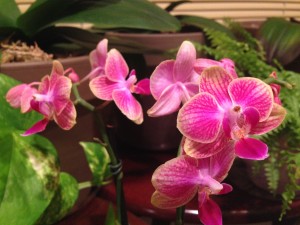Peace family, recently, I’ve been on an orchid-growing kick. The orchids that I’ve had for several years just finished blooming for the summer, so I’ve re-potted them and am gearing up to help them develop their roots and leaves so that they will make beautiful flowers again next year.
I didn’t know a whole lot about proper orchid care, so I did some digging. Orchids live in wild, extreme climates all over the world, but as far as I know, the ones that people have been able to grow in civilization have almost all been tropical varieties. They are epiphytes, meaning that they usually grow in a clump of moss or other plant material in the crook of a tree in the rain forest. They like humidity, but they need a lot of air around their roots. Even though a lot of houseplants like a lot of water, over-watering is actually the quickest way to kill an orchid.
Orchids also like warmth, which is why although a lot of people like to water them with ice-cubes, I don’t think it’s good to do so. They live in hot places, so being exposed to such cold temperatures can shock and hurt them. Watering an orchid with ice cubes keeps the orchid from being over-watered, but it can cause scars on the roots.
Orchids also have special lighting needs. They like bright light, but bright light that is mottled with shadow, just like what they get when they are hanging in a tree branch in nature. Even though some house plants want all bright light and some need a lot less light, orchids need a special balance.
All this to say: Good gardeners take time to learn where a plant came from and think about its natural habitat. When you do that, it makes it easier to know what a specific plant needs and how to care for it. Even if the care needs are difficult, just understanding why the plant needs what it does and how it grows, makes caring for a plant a richer and more successful experience.
Peace family, we can love people powerfully by using this same technique! Be willing to truly listen to someone’s heart, and not just come up with “all the answers” in the moment that they are sharing with you; what worked for someone else, doesn’t always work in every situation, because people are individuals. Be patient and take time to understand where someone is coming from. Remember a person’s past, their age, and their culture, and take those factors into consideration as you watch loved ones work through issues in their lives. Not everyone needs to be loved in the same way, and sometimes listening well, praying, and thinking through someone’s most likely needs can make a huge difference in bringing someone closer to Christ and feeling truly loved.
Peace family, you can do it! I encourage you to listen well and love well this week!

You must be logged in to post a comment.